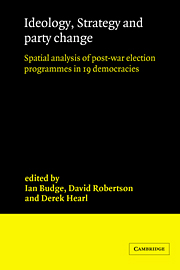 Ideology, Strategy and Party Change
Ideology, Strategy and Party Change Published online by Cambridge University Press: 27 October 2009
Since we were constituted as a research group of the European Consortium for Political Research, and participated in its second Joint Research Sessions in the autumn of 1979, we have amassed many debts to individuals and institutions. It is hard for any cross-national group to keep together, even in receipt of unified and generous foundation funding. Cross-European research does not receive that kind of support, but what we have lacked in the way of funds has been balanced by the prompt aid given to us from a variety of sources.
The Consortium is responsible both for the creation of the group and for its continuing existence. Its support is part of a long term strategy for the encouragement of inter-European research, which has covered the work of groups like ours, and is still expanding. But nobody could have been more personally concerned to make our group a success than the successive Chairmen of its Research Board, Jean Blondel and Ken Newton; and its Chairman Rudolf Wildenmann.
The grant which gave us our initial impetus came (without bureaucratic delays or conditions) under the enlightened Small Grants Scheme of the Nuffield Foundation (Soc/205/125): the sympathetic Administrator was Pat Thomas. Later we received help, like the other ECPR Research Groups, from a general grant from the Tercentenary Fund of the Bank of Sweden, which Professor Leif Lewin, of the University of Uppsala, was particularly instrumental in obtaining for the ECPR programme.
To save this book to your Kindle, first ensure no-reply@cambridge.org is added to your Approved Personal Document E-mail List under your Personal Document Settings on the Manage Your Content and Devices page of your Amazon account. Then enter the ‘name’ part of your Kindle email address below. Find out more about saving to your Kindle.
Note you can select to save to either the @free.kindle.com or @kindle.com variations. ‘@free.kindle.com’ emails are free but can only be saved to your device when it is connected to wi-fi. ‘@kindle.com’ emails can be delivered even when you are not connected to wi-fi, but note that service fees apply.
Find out more about the Kindle Personal Document Service.
To save content items to your account, please confirm that you agree to abide by our usage policies. If this is the first time you use this feature, you will be asked to authorise Cambridge Core to connect with your account. Find out more about saving content to Dropbox.
To save content items to your account, please confirm that you agree to abide by our usage policies. If this is the first time you use this feature, you will be asked to authorise Cambridge Core to connect with your account. Find out more about saving content to Google Drive.